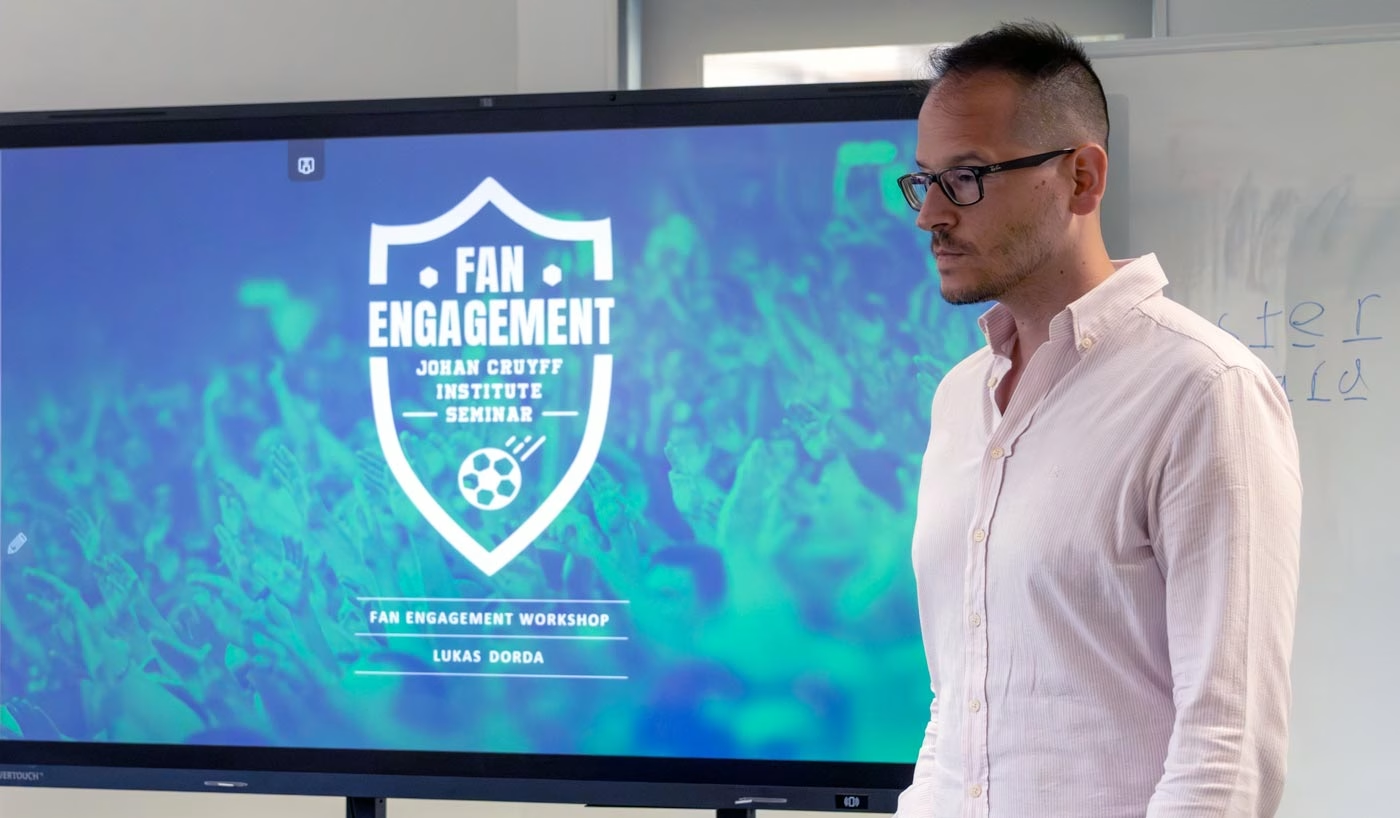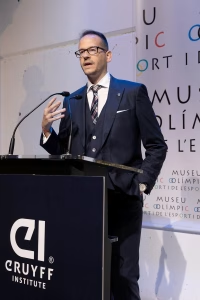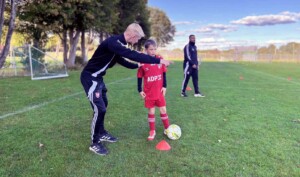
In this interview, Lukas Dorda explains his professional background and his work at Johan Cruyff Institute, delving into the challenges of academic management
Lukas Dorda’s professional career combines international experience in the sports industry with a strong commitment to education. Currently, as Associate Academic Director at Johan Cruyff Institute, he focuses on consolidating the Institute’s online educational programs. His relationship with the institution dates back to 2012, when he decided to pursue a master’s degree that would allow him to enter the sports industry.
In this interview with Impulsyn, Lukas shares what his day-to-day work at Johan Cruyff Institute looks like, reflects on his professional journey, and offers practical advice for those looking to take their first steps in the sports industry.
Lukas, you were once a student and are now Associate Academic Director at Johan Cruyff Institute. What was that journey like?
It’s a bit curious. I arrived in Spain about 11 or 12 years ago and I didn’t speak Spanish. I already had experience working in sports, with federations and in marketing, but in Spain I couldn’t work because of the language. I started teaching English just to get by and to learn Spanish.
But I wanted to work in my field, so I decided to study to open the door to the industry. In 2012, I did my first online master’s at Johan Cruyff Institute, because I couldn’t afford to study full-time. It was an online master’s in sports management, in English. Then I continued with one focused on marketing and sponsorship. Today, we offer a Master in Sport Business Online, with two specializations: sports management, and marketing & sponsorship.
After studying, I started receiving offers, in consulting and from brands like Reebok. But I always stayed connected with the Institute. In 2014 or 2015, I contacted Johan Cruyff Institute to see if I could teach; they accepted me, and that’s how my professional involvement began.
Why did you choose Johan Cruyff Institute to study?
On the one hand, Johan himself, whom I had the chance to meet—at my first graduation, he personally handed me my diploma. That connection comes from family: since I was little, my father has been a huge Barça fan and often talked to me about Johan. Studying at Johan Cruyff Institute was perhaps a way of fulfilling my father’s dreams.
But also because of the institution itself. From the beginning, even when I hadn’t decided yet, they called me and explained the programs very clearly. On top of that, the flexibility they offered—like paying in installments—helped me make the decision.
What are the home countries of the students starting this year?

Lukas Dorda, Associate Academic Director at Johan Cruyff Institute.
It depends on the program. In the University Master’s Degree in Sports Management Barcelona, developed with the Universitat Autònoma de Barcelona, students are usually younger, in their twenties. For them, it’s a one-year experience in Barcelona, with classes almost every day.
In the Master in Sport Business Blended Barcelona, which we offer in Spanish and English, classes take place on Thursdays and Fridays. Here we see people who are already working and cannot dedicate a whole year exclusively to studying. These are more adult profiles, in their 30s or 40s, looking for knowledge, networking, and new professional opportunities.
Some students have been in the sports industry for years but lack a formal degree. They seek certification to support their experience and allow them to enrich what they already do or explore new ways of working.
How do you approach digitalization, streaming, social media, and Artificial Intelligence? Do you have modules covering these topics?
We’re running some tests, but it’s important for us not to lose our identity.
“The human touch is essential; we strive to stay close to students. Although we were pioneers in online education, we ask professors not to use AI for feedback, but to provide it themselves.”
We try to avoid the use of AI in certain tasks because we believe what makes us unique is the human essence and our professors’ own expertise. We have two basic courses called Essentials, on football and sports management, which are quite self-guided. They were not created with AI; instead, we wanted to test student autonomy without constant teacher intervention.
What is your day-to-day like as Associate Academic Director?
Currently, I work on the portfolio of online courses. In recent years, we’ve created a lot of new offerings: two master’s degrees, three postgraduate diplomas, specialized diplomas, and over thirty online courses, all available in English and Spanish.
My role is strategic, not operational. Our goal is to maintain the academic quality of all programs. We’ve ranked number one in Europe for online master’s programs in SportBusiness for three consecutive years.
The same applies to the Master in Football Business in partnership with FC Barcelona.
“The goal is to maintain academic quality, bring in the best professionals, and continuously update content.”
For example, the Marketing & Fan Engagement course is updated every edition, because much of the content becomes outdated from one year to the next.
What is Johan Cruyff Institute’s most in-demand program?
It depends on the person. If you like football and can do it, the Master in Football Business in partnership with FC Barcelona is a privilege: access to leading professionals, visits to European stadiums, and trips to England, Germany, and the Netherlands. Classes are held once a month.
For those who cannot travel, there is an online version that allows you to study from anywhere in the world. For young people who want to live the Barcelona experience for a year, the best option is the University Master’s Degree in Sports Management Barcelona.
Do students look for jobs after the more on-campus-based master’s programs?
Yes, especially the more junior students. At the SPORTS BUSINESS Job Fair in March, we observed that it’s key to understand job requirements. For example, working in Spain requires speaking Spanish, and in Barcelona, Catalan as well. Without these languages, it’s very difficult to access certain jobs.
Although there are international opportunities, most local positions require fluency in the language.
What is the main challenge students face?
It’s understanding what sports really are in all their dimensions. Many arrive with enthusiasm for marketing or agencies, but don’t realize it’s a demanding job: travel, long hours, and challenging weekends. For example, in Middle East projects, the workweek starts on Sunday.
Convincing students that sports require nearly 24/7 availability is fundamental.
What are the most in-demand hard and soft skills?
Today, digital knowledge is essential: CRM, automation, funnels, and lead generation strategies. But soft skills are equally important. Empathy, teamwork, and adaptability are key.
“It’s important to combine technical skills with interpersonal skills, developing leadership and intercultural experience.”
How do you measure employability impact?
“We have a Career Services and Alumni Manager team, and a network of more than 10,000 alumni.”
Many former students are now online professors, bringing practical experience and fresh perspectives. Although we support students, as an educational institution we cannot guarantee employment. What we can do is provide tools and connections to help them advance professionally.
Finally, what’s new at Johan Cruyff Institute for this academic year?
Next Tuesday, March 10, we’re holding the second edition of the SPORTS BUSINESS Job Fair. As in the first edition, all academic institutions with sports programs will participate. We’ll also organize a networking round with the sector’s leading companies: LALIGA, Deport Village, Sprinter, Decathlon, Fitness Park, Viva Gym. As last year, the fair is organized by Johan Cruyff Institute and Impulsyn.






